Making a home for Jupiter
An active exercise in living with the archetypes.
My first year of astrology training recently finished.
It still surprises me to look back at the not-too-distant version of me who would’ve scoffed at the mere mention of astrology. I picture the atheist, materialist, “I’ll believe it when I see it” Maria looking at me with the same befuddlement I now feel looking back at her. One of us has to be insane, I imagine us utter in unison. And I wouldn’t blame her if she thought that was me: after all, I’m the one mumbling to myself while fervently riffling through old second-hand books up in my attic bedroom and squealing with childish delight whenever I finally understand something. She did a good job at hiding her despair and leading a fairly “normal” life.
The truth is I rarely felt as inspired by a new subject as I did by astrology. I also never felt dumber, as astrology demands an in-depth, embodied understanding of archetypes, unlike any other discipline.
The gods are not just planetary names on a paper; they’re very much alive in us. They circumambulate our natal charts, stirring old conflicts, poking at old wounds, or opening our eyes to fresh opportunities. They meet each other in blissful harmony or in epic battles of mythological proportions. They pull us in different directions, forcing us to find new ways forward.
They want us to work with them: not by being good students who perfectly recite Jung’s work on the Great Mother, but by tuning in and learning how to dance with them.
I was keen to discover how this dance works for myself. As if by cosmic design, last month’s holiday in Italy coincided with a pivotal moment in my astrological journey: Jupiter (corresponding to the Greek god Zeus) was preparing to enter my fourth house, representing the home, my roots, my ancestry.
Jupiter’s transits1 come with lots of expectations—particularly due to his reputation as “the great benefic”: imparting good humour, good times, better understandings, and expanding possibilities. And as any new student of astrology, I found it hard to resist trying to predict how Jupiter’s transit might unfold for me. Maybe could help me win the lottery (well, if I played) and buy a home; maybe he could inspire me to have a good time with people I live with. Or, on a more subtle level, maybe he could facilitate a deeper understanding of childhood dynamics and feelings related to having a home.
Although it’s impossible to predict how things go with any transit, one thing became clear to me: that if I wanted to make the most of this significant period, I would need to remain conscious. I would need to hold my ego’s desires for abundance lightly and meet the great Jupiter halfway, willing to accept his own plans for me. Ego and archetype would need to enter a dance together.
The gods in the museum
Synchronicity made it so that, on my trip, I discovered that two Roman temples to Jupiter were a short drive from my destinations: his temple in the ancient city of Pompeii and another temple dedicated to a young Jupiter, Giove Anxur, in Terracina. And not only that: the remains of Jupiter’s bust from Pompeii were conveniently displayed in Naples’ Archeological Museum, a 5-minute stroll from my apartment.
I was deeply moved by these synchronicities: my intention to meet the god halfway was actually materialising, almost by magic. There I was, visiting Jupiter’s home(s), just as he was about to come visit mine!
Visiting these three locations made me reflect on the current state of our psyches. There’s something ineffably striking about these Roman statues from 1 BC still standing the test of time—albeit no longer in their grand temples (and maybe missing a limb or two), but shielded in a poorly-lit, tepid museum, the only offering available being the 22 euros entrance fee you pay at the front before Pasquale, the museum guard, asks where you’re visiting from.
Perhaps I’m speculating here, but it seems rather apt to say that our numinous function is in ruins, much like the temples to these gods. I cannot help but feel envious of the Romans and ancient Greeks who got live their polytheistic mythology so deeply. The people who, standing in front of Jupiter’s mighty statue on top of the cliff in Terracina, might feel the breeze to be the benevolent god’s reassuring presence from the sky; the same people who would have stood exactly where I did, watching the Italian coast stretch far into the distance, all the way to Circe’s mountain, wondering about the mystery of being.
The only offering
Sitting in meditation on the ruins of Jupiter’s temple, I wondered what fair offering I could give to the god ahead of his transit. After all, what could I, a small mortal who’s here to ask for help, have to offer the great Zeus in return?
I was reminded of promises I used to make as a child to the Christian god I was raised to believe in. That I would be good, that I would obey my parents, that I would try to keep my room tidy, that wouldn’t lie. I remembered how I used to live in fear of the god’s revenge when I inevitably forgot my promises or broke them—like sneakily watching MTV before school and dancing to Christina Aguilera’s iconic Dirrty video, instead of studying harder.
Then it struck me: there’s absolutely nothing I can offer Jupiter. Well, nothing except for a home in myself.
I could rescue the great god from the tired museum and invite him into my life: into my body, my altar, my thoughts, my home, my actions. I could try to make every day a living temple for the great god. I wouldn’t do this out of fear, like when I was a child, but out of the undeniable reality that there’s no me without Jupiter and there’s no Jupiter without me. And I would do this for all the other gods of the pantheon.
Now off to you:
If you resonate with an archetypal, polytheistic perspective of the psyche, how do you bring that awareness in your everyday life? What little actions do you or could you take to honour the gods?
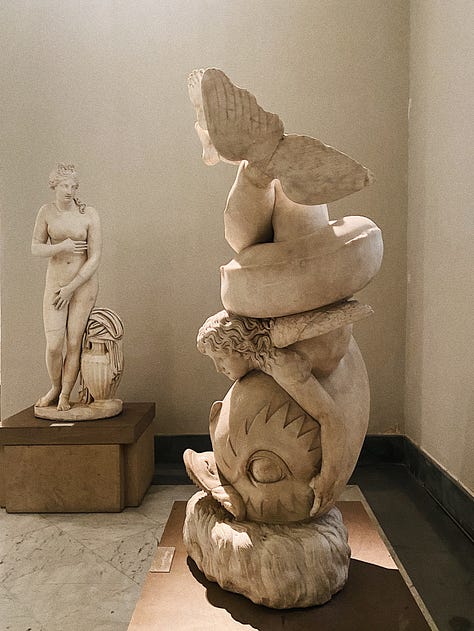
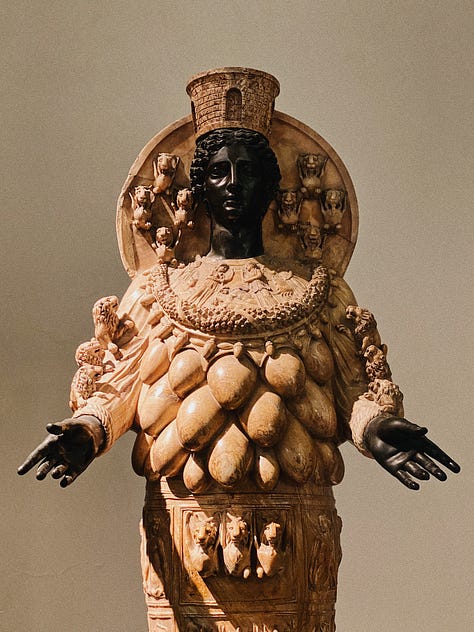
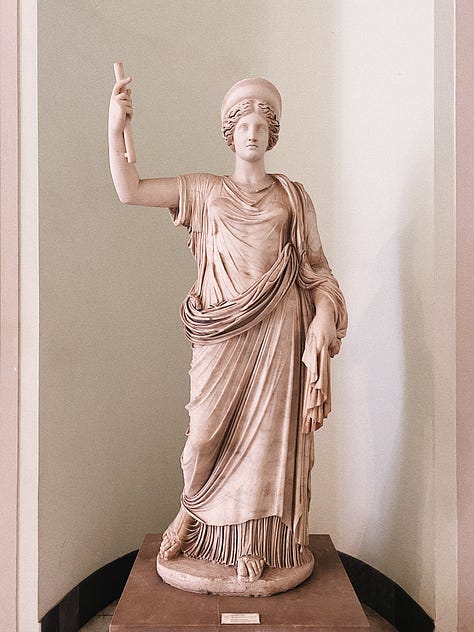
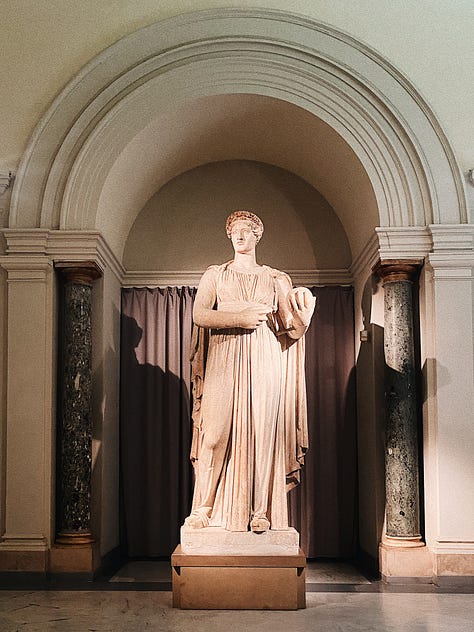
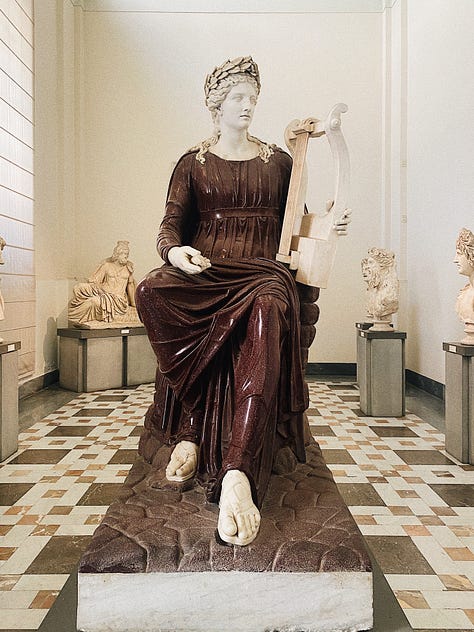
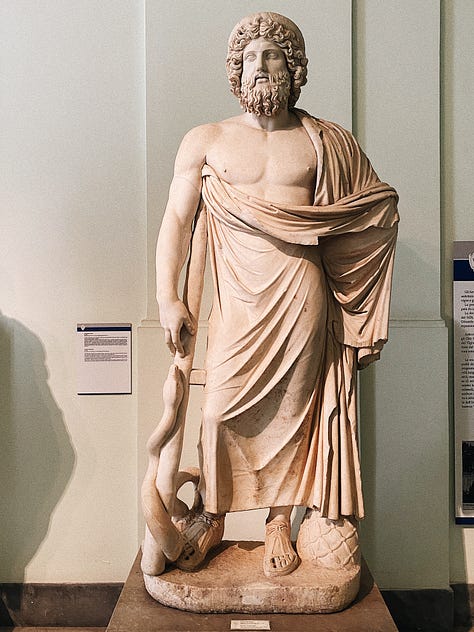
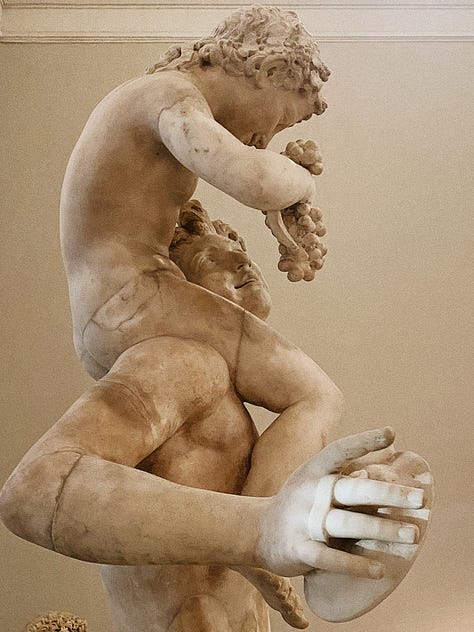

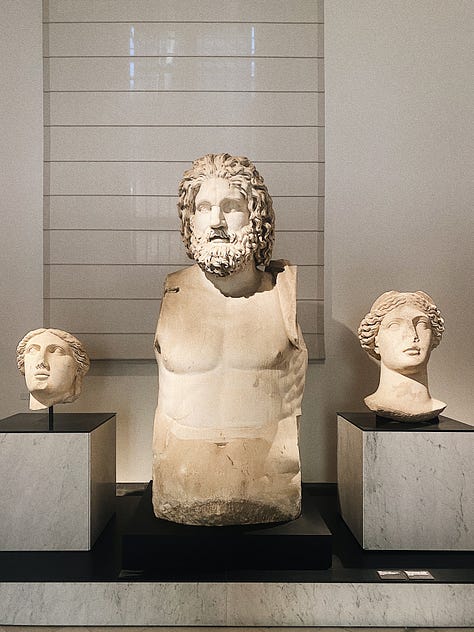
Transits in astrology refer to a planet’s movement through a particular area of the natal chart. Each transit can be seen as that god or archetype “visiting” an area of your chart, corresponding to the house that it transits and/or the natal planet. This brings the particular energy of that archetype into that particular area of your life, which is now emphasised.
Eros with dolphin and Aphrodite in the background
Hera
Urania holding the globe
Asclepius
Dionysus
Hercules
Jupiter, flanked by Minerva and Juno

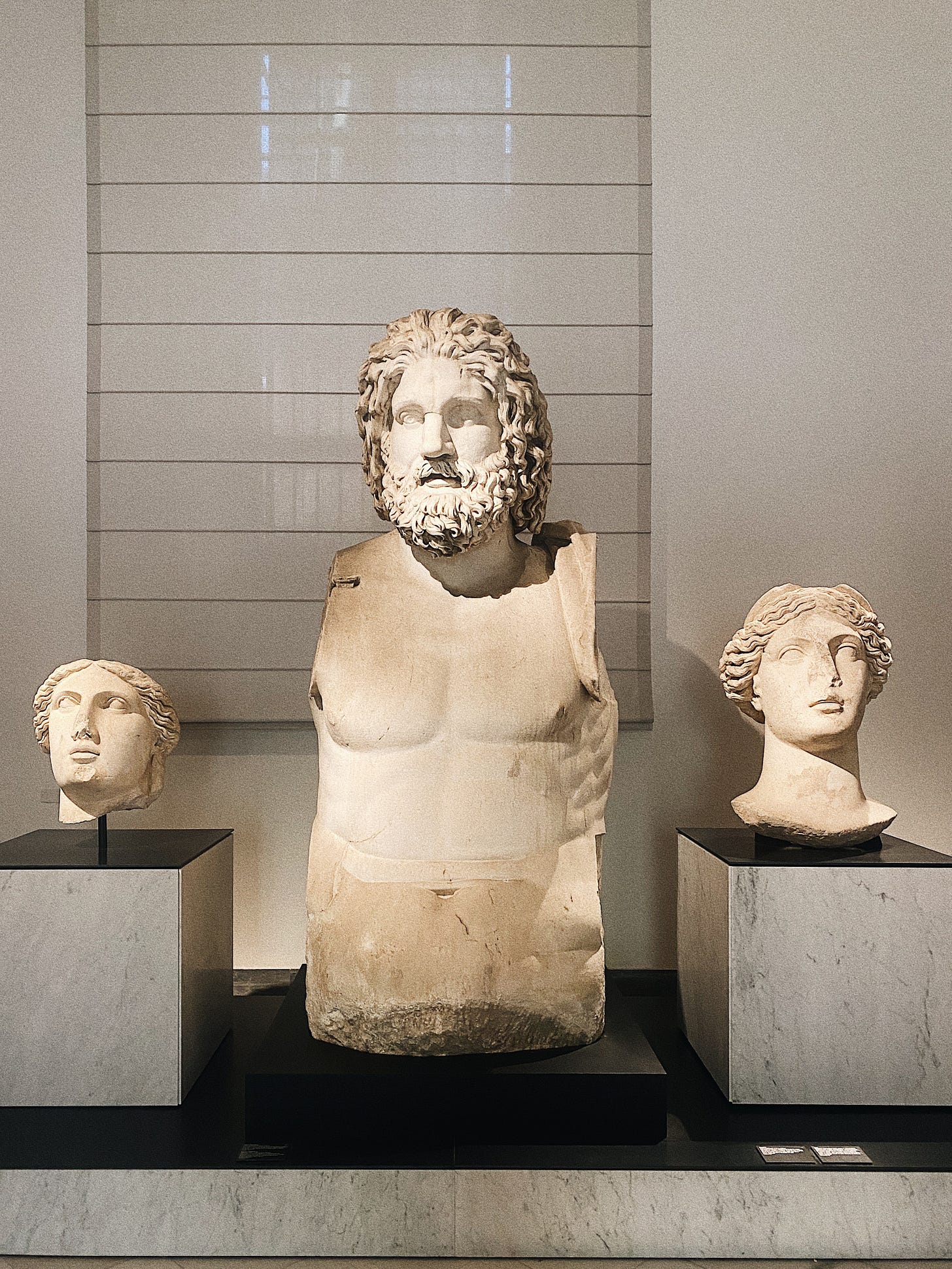
What a fun idea, Maria! Allowing the gods to live through you, and you through them. I'm a mild student of astrology myself - also being raised to fear the Christian god and ignore things of the occult. My chart shows Jupiter conjunct Mercury... any idea what that means?
For me Jupiter is transiting my first house of the self and of consciousness. I am expanding my identity by venturing into new beginnings pertaining to the other houses that Jupiter rules in my chart which is the 7th house of long term partnerships and 10th house of career which is very fitting since I'm starting a new job and started my substack recently. In terms of offerings I haven't provided anything concrete but I am having faith and hope for a better, more aligned future which is on par for Jupiter's optimism and sometimes blind faith.